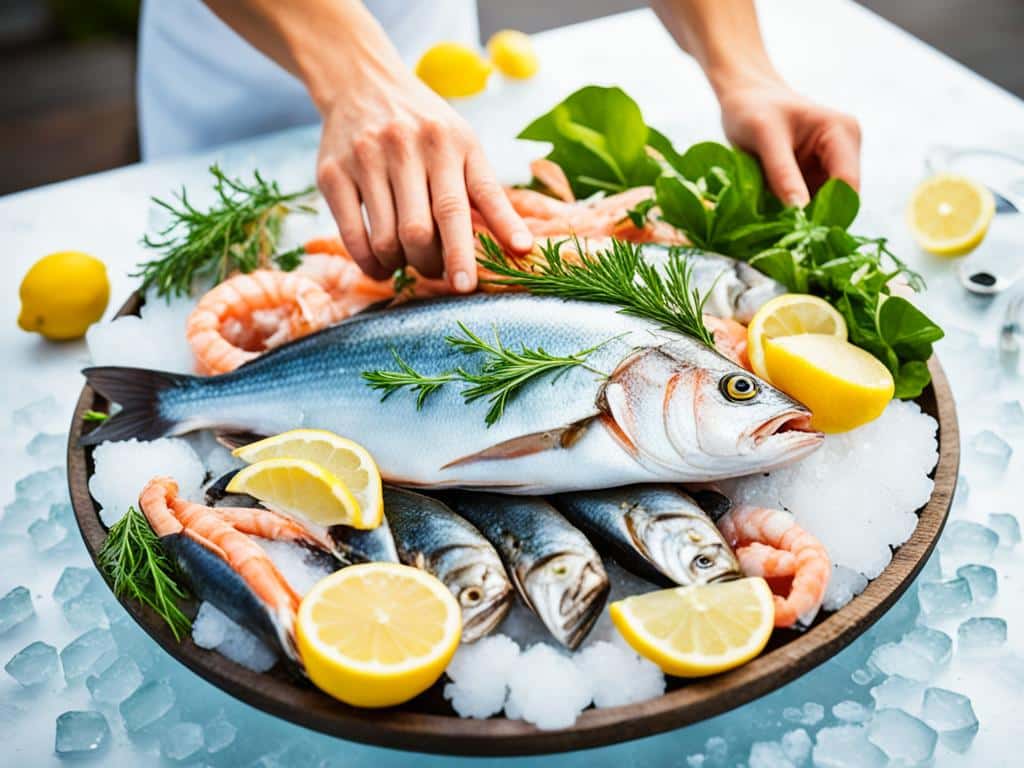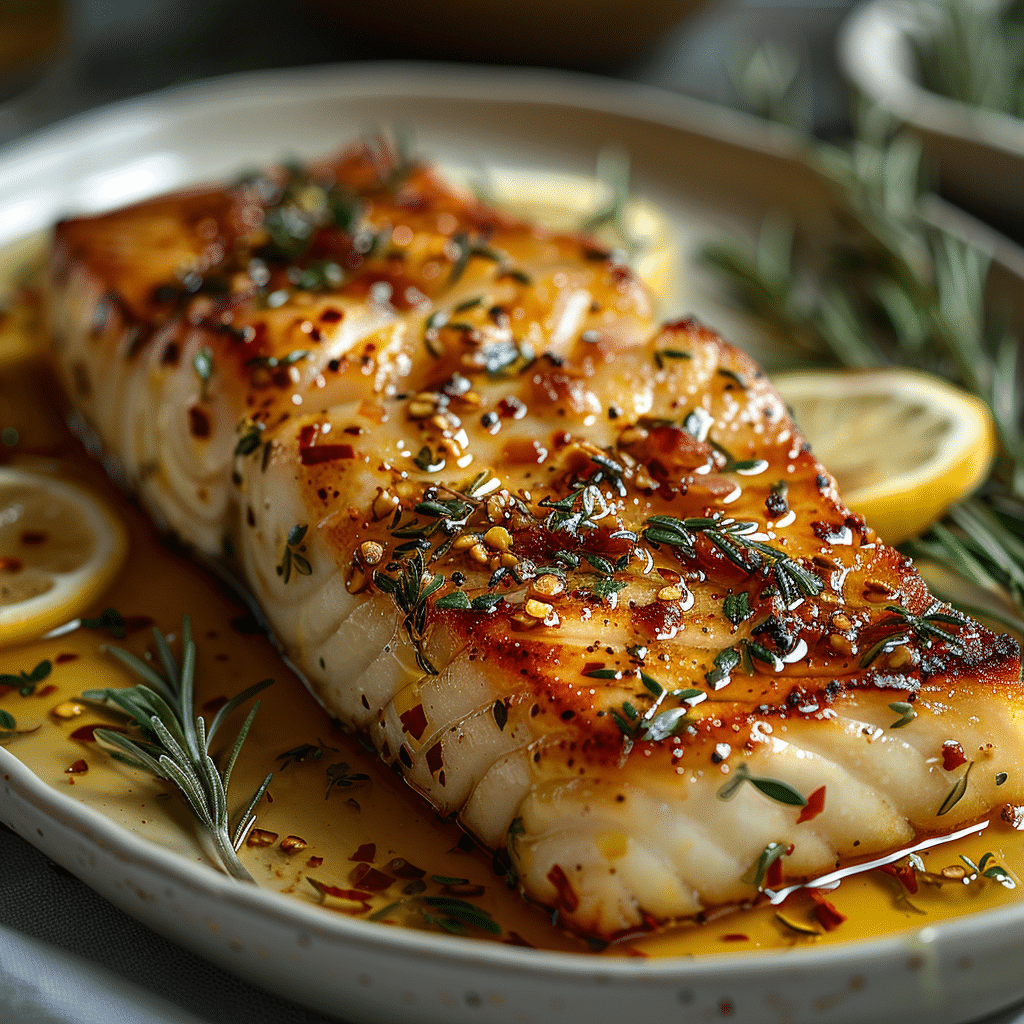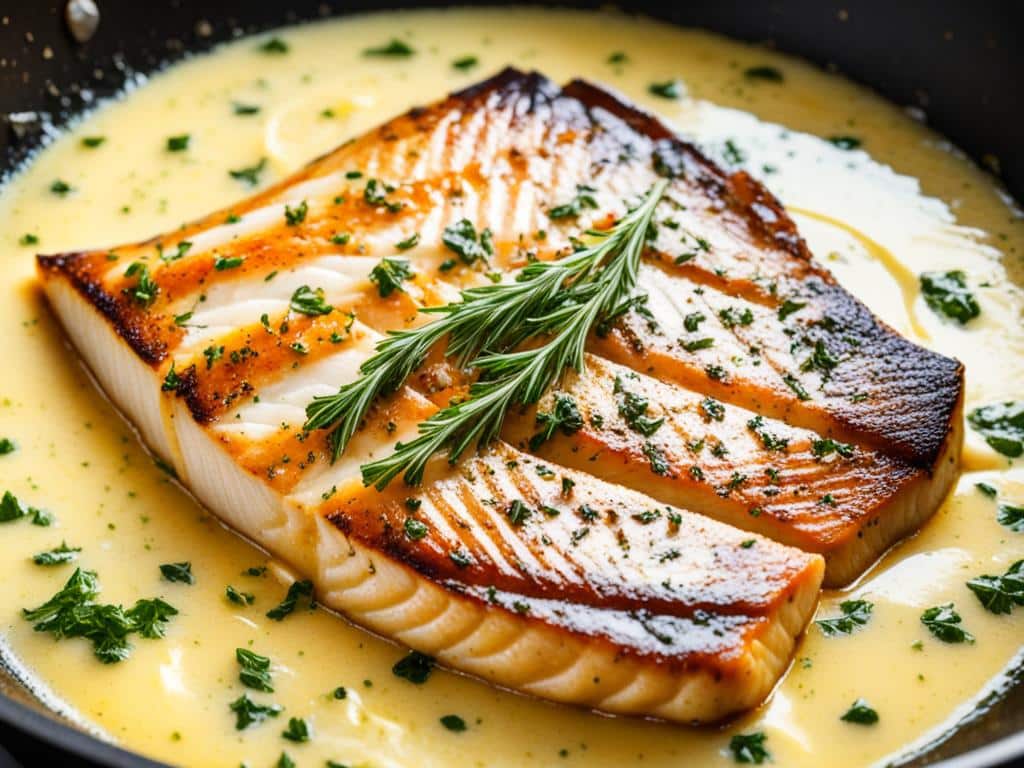Delicious and Easy Butter Poached Fish Recipe
Jump to Recipe
Who says giving up rich flavors on a low-carb diet is necessary? I’ve traveled the world and picked up a simple way to cook fish. This method makes fish like monkfish, snapper, and cod delicious and keto-friendly.
It has just 268 calories per serving and packs 34g of protein. By gently cooking the fish in butter, it turns incredibly tender. I prefer unsalted butter to control the salt, making each bite healthy and tasty.
The mix of shallots, lemon juice, and chives creates a flavor-filled sauce. This sauce makes the tender fish even more delightful.
This recipe is easy, so anyone can try poaching fish in butter. Plus, the butter sauce left over is too good to throw away. It’s great for other dishes!
Key Takeaways
- Low-carb, high-protein gourmet experience with only 268 calories per serving.
- Variety of fish options available, from monkfish and cod to snapper and sea bass.
- Unsalted butter allows for perfect custom seasoning without overloading on salt.
- Butter poaching offers a lighter alternative to frying, adding elegance without excess fat.
- The decadence of butter used for poaching enriches flavors while being keto-friendly.
- Saving and reusing poaching butter is not only thrifty but recommended for future dishes.
- Butter poaching is surprisingly simple, making it accessible for cooks of all levels.
Introduction to Butter Poached Fish
On my travels, I’ve loved learning how to make butter poached fish. This method really brings out the best in fish, making its flavors shine without masking them. It cuts down on the use of oils, reducing the amount of saturated fat.
Talking about cooking seafood, the trick is using simple, high-quality stuff. Butter, mixed with fragrant herbs like rosemary, garlic, and mint, is my go-to. I’ll sometimes add a bit of lemon. This isn’t just about flavor—it makes the fish tender and juicy.
Using heart-healthy olive oil instead of butter can suit different diets while keeping the dish luxurious. It’s still a top pick for making a rich, yet healthy meal. Whether it’s olive oil, peanut oil, or duck fat, the outcome is always delicious.
Soft white fish and seafood like scallops and shrimp are perfect for butter poaching. They soak up the poaching liquid’s rich tastes. This method is not only quick but also forgiving. A little extra time in the pot makes the fish even better, not dry.
This method marries taste with health, offering luxury along with wellness. It’s great for fancy meals and easy enough for weeknight dinners. It shows how versatile and convenient butter poaching can be.
The Secret to Perfect Butter Poaching
To master butter poaching, begin by learning about heat and timing. The aim is to get a soft texture and great flavor in your seafood. This is done by carefully managing the cooking process.
Understanding the Basics of Poaching in Butter
Butter poached fish’s success lies in how heat interacts with fat. It’s about keeping a balance in unsalted butter, blending milk solids and fat. You start by melting the butter on medium heat without letting it separate. This creates a smooth liquid for poaching fish or shrimp.
Maintaining the Ideal Temperature for Poaching
The key is to keep the butter between 150°F and 170°F. This temperature cooks the fish gently without frying it. Your seafood stays moist and tender this way. It’s important for maintaining temperature to preserve the seafood’s flavor and texture.
Certain fish types like barramundi and cod require different poaching times. Thinner fillets take under ten minutes. Thicker ones may need up to twenty minutes. Using beurre monté technique ensures the poaching conditions are perfect. It boosts the fish’s natural flavors.
| Seafood Type | Recommended Poaching Time | Butter Temperature |
|---|---|---|
| Thin Fish Fillet | Under 10 Minutes | 150°F – 170°F |
| Thicker Fish Fillet | Up to 20 Minutes | 150°F – 170°F |
| Spot Prawns | Approximately 5 Minutes | 150°F – 170°F |
Knowing how to control your poaching conditions will improve your dish. It shows your skill and respect for the ingredients. A successful butter poach transforms simple ingredients into an amazing meal. It highlights the elegance of well-cooked seafood.
Choosing the Right Fish for Butter Poaching
Choosing the perfect fish is key for a great butter poached seafood dish. I often suggest monkfish for its firm texture and slight, lobster-like sweetness. It’s a top pick for butter poaching. This lean white fish takes in the butter flavors, becoming tender and irresistibly tasty.
Fish like snapper, sea bass, and halibut are also great for poaching. They have lean and strong structures that work well with rich butter. For a different choice, scallops are great. They quickly soak up the aromatic flavors from the butter.
Here’s a useful table to help pick the best seafood for butter poaching:
| Seafood Type | Texture | Poaching Suitability |
|---|---|---|
| Monkfish | Firm, meaty | Excellent |
| Snapper | Semi-firm | Very Good |
| Sea Bass | Firm | Very Good |
| Halibut | Dense, flaky | Good |
| Scallops | Soft, delicate | Excellent |
Choosing the right fish isn’t just about taste. It’s also about how well the fish can handle the soft cooking method without falling apart. Always go for fresh seafood for poaching. Freshness affects both the texture and how well the fish picks up the buttery tastes.

In summary, whether you pick monkfish or another lean white fish, make sure it goes well with the butter poaching technique. Take time to explore these choices. Enjoy the tender, flavor-rich results of your cooking efforts.
Delightful Butter Poached Fish Recipe
Creating a butter poached fish brings a touch of class to seafood cooking. This method boosts the fish’s taste and makes it juicy with unsalted butter and fresh herbs. Let’s explore how to make this delightful dish.
Gathering Your Ingredients
Start by collecting the best ingredients. Choose fresh, boneless fish that goes well with unsalted butter. Add fresh herbs and finely diced shallots for flavor, and lemon juice for a splash of zest. Together, these ingredients create a tasty and attractive meal. Make sure you have everything you need before you begin:
- 12 ounces of fresh, boneless fish
- 6 ounces of unsalted butter
- 1 tablespoon of lemon juice
- 2 teaspoons of finely diced shallots
- Fresh herbs (optional but recommended for garnishing)
Step-by-Step Cooking Instructions
Begin poaching by heating 2 tablespoons of unsalted butter in a pan over medium heat. Cook shallots until soft to release their flavors. Then, add lemon juice and the rest of the butter slowly until it melts. This forms a gentle poaching liquid.
Next, add your fish to the pan, making sure it’s covered by the butter mix. Cook it gently to keep the butter from boiling too hard. This method ensures a moist and tender fish. When it’s done, season with salt and decorate with fresh herbs for extra taste.
Follow this butter poached fish recipe closely, and you’ll make a dish to remember. Below is the nutrition info per serving to keep you informed about what you’re enjoying:
| Nutrient | Amount |
|---|---|
| Calories | 268 |
| Protein | 34g |
| Fat | 14g |
| Saturated Fat | 8g |
| Cholesterol | 115mg |
| Sodium | 90mg |
| Potassium | 513mg |
| Vitamin A | 355IU |
| Vitamin C | 2.9mg |
| Calcium | 17mg |
| Iron | 1mg |
Loving the process makes your butter poached fish special. By following these steps and using fine ingredients, each bite will show your dedication.
Customizing Your Poach: Herbs and Spices Additions
The magic of a dish often lies in making it your own. Adding fresh herbs and spices to butter poached fish turns it into a special meal. It’s all about using your creativity. You can pick fish like cod, halibut, or salmon. These are all great for poaching because of their taste and texture.
Infusing Flavors with Fresh Herbs
Herbs like dill, parsley, basil, and chives do more than add looks; they add depth. I like to simmer them gently to bring out their flavors. They help make the fish tastier and healthier, adding proteins, vitamins, and minerals.
The Role of Citrus in Enhancing Taste
Citrus like lemon, lime, or grapefruit adds a zesty contrast to buttery fish. It’s not just about taste; it’s about freshness too. Citrus cuts the richness, improving the flavor. That’s why many chefs love adding citrus to their recipes.
Adding such flavors to your dish makes it a delight, both tasty and healthy. With around 660 calories per serving, it’s indulgence without guilt. Whether you add coconut milk or give it a smoky grill finish, watch the cooking time. Different fish thickness requires attention. These tips will help you make a dish that’s not just good for you but also shows your cooking skills.

Butter Poached Fish
Ingredients
Method
- Prep the Ingredients: Gather all ingredients. Ensure the fish is fresh and boneless.
- Melt the Butter: In a pan, heat 2 tablespoons of unsalted butter over medium heat.
- Cook the Shallots: Add the finely diced shallots and cook until they are soft and fragrant.
- Add Lemon Juice: Pour in the lemon juice and slowly add the remaining butter until fully melted.
- Poach the Fish: Place the fish in the pan, making sure it's covered by the butter mixture. Keep the butter between 150°F and 170°F, ensuring it doesn’t boil.
- Cook Gently: Cook the fish until it's tender and cooked through. Thinner fillets will take under 10 minutes, while thicker ones may take up to 20 minutes.
- Season and Serve: Once done, season with salt to taste. Garnish with fresh herbs and serve immediately.
Notes
- Unsalted butter allows for better control over the seasoning.
- Fresh herbs enhance the dish's flavor and presentation.
- This dish can be customized with different herbs and spices based on personal preference.
- Save the leftover butter sauce for future dishes to add rich flavors.
FAQ
What is butter poached fish?
Butter poached fish is a way to cook fish gently in melted butter and sometimes other flavorful items. It’s done over medium heat. This method makes the fish moist and tasty. The butter adds wealth to the fish’s flavor, making it popular for both simple and fancy seafood meals.
Is butter poaching better than frying?
Yes, butter poaching is healthier than frying. It uses less oil, cutting down on saturated fats. The fish keeps its natural taste and stays moist without needing high heat or a lot of fat.
What is the ideal temperature for poaching fish in butter?
The best temperature for butter poaching fish is between 150°F and 170°F (65°C to 76°C). This temperature range cooks the fish softly. It keeps the fish tender and moist.
Can I use olive oil instead of butter for poaching fish?
Olive oil can be used to poach fish and is a healthy alternative to butter. However, using olive oil means losing the unique flavor and creaminess of butter. It offers a different taste and doesn’t add the same richness as butter.
Why should you use unsalted butter for poaching fish?
Unsalted butter lets you control the dish’s salt and seasoning better. It ensures the fish’s taste isn’t overpowered by salt, unlike with salted butter.
What kinds of fish are best for butter poaching?
Fish that are firm and rich taste great when butter poached, like monkfish, snapper, sea bass, cod, and halibut. Monkfish is a favorite because it tastes similar to lobster and is very tender.
What are the key ingredients for a butter poached fish recipe?
To make butter poached fish, you need fresh fish fillets, unsalted butter, lemon juice, shallots, and fresh herbs. These ingredients create a flavorful and aromatic dish.
How do you infuse flavors into the poaching liquid?
Add fresh herbs like chives, thyme, or tarragon, and citrus like lemon juice or zest to the poaching liquid. These enhance the buttery liquid and elevate the fish’s flavor.
What types of herbs can I use to customize my butter poached fish?
For your butter poached fish, try using parsley, dill, chives, tarragon, or thyme. Select herbs that match your fish’s flavor for a lively and herb-rich taste.
Can butter poached fish be considered keto-friendly?
Yes, butter poached fish fits well into a keto diet. It’s low in carbs and high in healthy fats from the butter. This makes it a good choice for keto meals.
